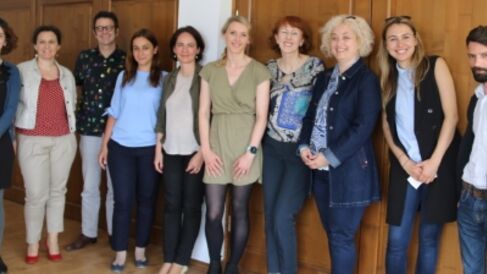
EBLS: set to support healthy child development in low- and middle-income countries worldwide
At the end of July 2018 we reached the end of our BA/Leverhulme Small Research Grant for the initial stages of the Evidence for Better Lives Study (EBLS), led by Dr Aja Murray and Prof Manuel Eisner. The Grant funded visits to the Study’s eight sites to build partnerships with local researchers and other activities that supported its setup.
The EBLS project is currently aiming to establish a multi-site birth cohort study focused on promoting healthy child development in low and middle-income countries across the world. In its first stage, Professor Eisner and Dr Murray, together with other EBLS partners – Professor Pasco Fearon, University College London and Professor Claire Hughes, University of Cambridge - visited nine prospective sites: Kingston (Jamaica), Cluj (Romania), Stellenbosch (South Africa), Tarlai Kalan (Pakistan), Koforidua (Ghana), Ragama (Sri Lanka), Hue (Vietnam), Pelotas (Brazil) and Valenzuela (Philippines).
 |
Dr Murray and Prof Eisner |
Prof Eisner, Dr Murray, Prof Pasco and Prof Hughes met with local research teams, officials, policy-makers, academics and practitioners. For example, during the visit to Jamaica, they developed project plans with Professor Susan Walker, met with key stakeholders in health (e.g. the Chief Medical Officer), child development (e.g. Minister of State in the Ministry of Education, Youth and Information; the local UNICEF Office) and presented the project’s plans in a seminar at the Caribbean Institute for Health Research. The visit also involved gathering basic data such as the number and location of health clinics we could sample data from. All visits involved similar activities and outcomes were recorded in reports.
A consortium was established to move the project forward, comprising Professor Manuel Eisner (University of Cambridge), Dr Aja Murray (University of Edinburgh), Prof Susan Walker (University of the West Indies), Prof Adriana Baban (Babes-Bolyai University), Dr Cathy Ward (University of Cape Town), Prof Mark Tomlinson (Stellenbosch University), Prof Vo Van Thang (Hue University of Medicine and Pharmacy), Prof Michael Dunne (Queensland University of Technology), Prof Claire Hughes (University of Cambridge), Prof Pasco Fearon (University College London), Prof Bernadette Madrid (University of the Philippines), Prof Asvini Fernando (University of Kelaniya), Dr Siham Sikander (Health Services Academy, Pakistan) and Dr Joseph Osafo (University of Ghana).
Literature review on violence exposure during pregnancy
As part of the grant, the consortium completed a narrative review on the topic of violence exposure during pregnancy. Its purpose was to help develop the conceptual framework and specific research questions for the EBLS project.
The review identified the pathways by which prenatal intimate partner violence (P-IPV) exposure can affect child development. These included maternal stress and mental illness, foetal attachment, maternal substance use, healthcare under-utilisation, suboptimal maternal nutrition and increased risk of maternal infection. These pathways are only partially addressed in antenatal care and in P-IPV interventions. The review identified key gaps in the literature on understanding P-IPV effects on mother and child, in particular, a need for longitudinal studies beginning prenatally.
Public presentations of EBLS
In May 2018 we held a public seminar as part of the Violence Research Centre’s series. As well as presenting the results and future plans, we also invited speakers from three other cohort studies that focus on child development: Dr Rosie McEachan from the Born in Bradford Study, Prof Johnathan Hill from the Wirral Child Health and Development Study and Dr Marta Favara from the Young Lives Study. The event provided an opportunity for mutual learning and strengthening of links between the studies. The seminar was videoed and is available on our website. Other public presentations of the Study included:
- Manila, 8-9 March 2017. Presentation of EBLS at the Inter-ministerial Child Welfare Group, Department of Public Welfare, Philippines and at the UNICEF Philippines Headquarters.
- The Evidence for Better Lives Study. Special seminar presented at the Caribbean Institute for Health Research, Jamaica, April 2017.
- Islamabad, 4 May 2017. Presentation of EBLS at the Ministry of Public Health.
- Ottawa, 17 October 2017. Evidence for Better Lives: A Global Research Initiative to Address Violence against Children, WHO Global Milestones of Violence Prevention Conference.
- Cape Town, 12 April 2018. Evidence for Better Lives: A Global Research Initiative to Address Violence against Children, University of Cape Town.
Lima, 14 June 2018. Evidence for Better Lives: A Global Cohort Study to Address Violence against Children, Pontifical Catholic University of Peru.
Next steps for EBLS
We are now entering the data collection stage of the project and are identifying appropriate research methodologies and unanswered questions so that the EBLS Study will be able to contribute information on healthy child development, starting from the prenatal period. Our funding application to the Botnar Foundation resulted in securing a grant to implement the Foundational phase of the Study. We will be collecting data on 1200 expectant mothers across the eight EBLS sites (150 per site).
Data will include both questionnaire data and biomarkers of stress and inflammation to gauge mother’s health and well-being. This phase started in June 2018 and will last 18 months. Another successful grant application to the ESRC Impact Acceleration Account will support a policy summit in Manila later this year. Ultimately, we aim to scale up EBLS to a longitudinal cohort study, following 12,000 pregnancies from across the eight sites until the child reaches school age.

